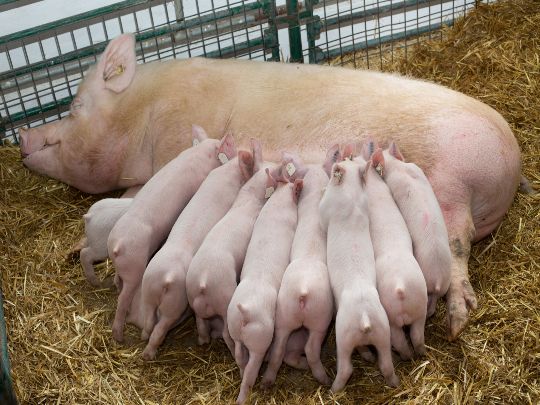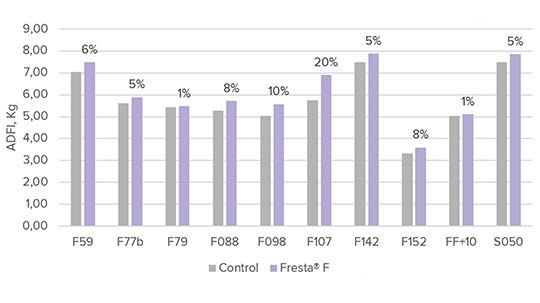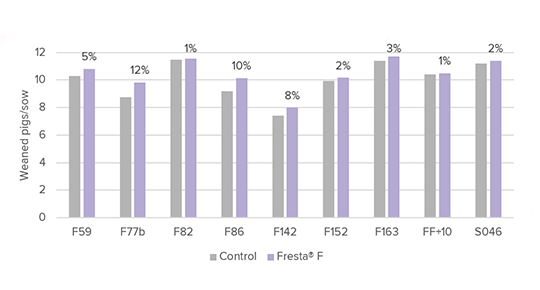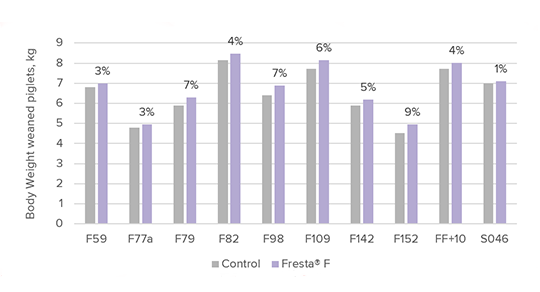Phytogenics can support lactating sows during challenging environmental conditions
Sows may encounter heat stress when exposed to high temperatures above their thermo-neutral zone (TN). The TN zone is the ambient temperature range in which the body does not need to activate cold or heat mechanisms to control hypothermia or hyperthermia.
Heat Stress
The TN zone for sows is between 15-20°C. During heat stress, sows increase respiration rate. They redirect blood flow from tissues and organs (including the mammary gland and gut) to the skin to transfer metabolic heat to the environment. The redirection of blood causes a cascade of adverse effects such as dehydration, organ injury, gut permeability, and inflammation. Sows' production systems are likely to be impacted by heat stress during the summer season or regularly in locations where an environment of high temperatures is constant (tropical zones). The lactating sows are highly vulnerable to heat stress. Lactating sows exposed to temperatures over 25°C usually experience a marked decrease in feed intake.

Heat stress in sows has consistently been associated with a reduction in voluntary feed intake and milk production, an increase in sow body weight, and a reduction in the growth rate of the litter (Boddicker et al., 2014; Lucy and Safranski, 2017). Moreover, heat stress also affects the subsequent reproductive cycle of the sow. Heat-stressed sows have longer intervals between weaning and estrus or fail to return to estrus. Embryo losses are compromised during heat stress conditions, reducing the farrowing rate and the number of pigs born and increasing non-productive days. First-parity sows are the most vulnerable group (EInarssons et al., 2008).
Lactation feed intake is essential in litter performance and the sow reproductive performance. Managing sows' feed intake during lactation is crucial to success in sows' farms. Among nutritional strategies, various feed additives can stimulate feed intake in sows.
Did you know?
Phytogenics feed additives (PFA) are recognized for their potential to boost feed intake and improve growth performance, nutrient digestibility, and normal gut health of livestock species, including swine (Valenzuela-Grijalva et al., 2017). They are commonly defined as plant-based additives or a group of natural substances from different origins, like essential oils, bitter and pungent substances, mucilages, flavonoids, tannins, and saponins.

Delacon has developed a mixture of phytogenic compounds of essential oils, flavonoids, spicy substances, and mucilages to support feed intake in lactating sows. Several studies have been conducted under diverse climate conditions in different world regions. Figure 1-3 shows a collection of 9-10 studies. In each study, sows were fed either a control diet or a diet supplemented with a phytogenic product (Fresta® F 400 g/MT) days before farrowing and during the whole lactation period. Figure 1-3 shows the treatments' response to average daily feed intake during lactation, the number of weaned pigs per sows, and pigs' body weight at weaning, respectively.
The figures indicate that under the conditions of those studies, lactating sows supplemented with the phytogenic product presented a consistent improvement in feed intake (on average +6%), the number of weaned pigs per sow (on average +5%), and pigs' body weight at weaning (on average +5%) compared to the control treatment. These data shows that this specific phytogenic formula can support lactation feed intake and litter performance.
Conclusion
Heat stress conditions challenge the swine industry, especially for lactating sows. Dietary solutions that can help lactating sows cope with heat stress should be implemented, along with management strategies to maximize the sow performance.




Roberto Montanhini Neto
Veterinary doctor, with MSc. and Ph.D. in veterinary sciences, and with relevant experience in leading integrations, premix and feed additives companies. With more than 18 years of experience in the Brazilian and international markets, always focused on developing animal nutrition and feed production projects, especially poultry, swine and aquaculture. Has been working for Delacon since 2018, and currently holds the position of Global Unit Lead, Monogastric.

Kory Moran
Dr. Kory Moran earned a Ph.D. in swine nutrition at North Carolina State University. She has been involved in the swine industry for the last 8 years. She has been conducting applied and practical research work focused on the use of fiber, enzymes, and phytogenics feed additives in swine nutrition. She joined Delacon in January 2017. Currently, in her role, she provides technical support to swine producers in North America and Latin American markets.










